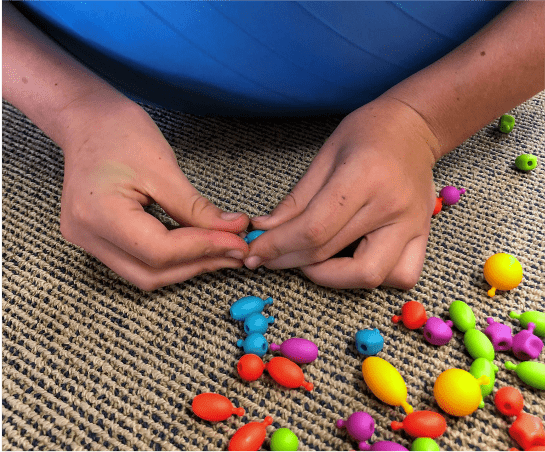
When we think of fine motor skills in children we often think of difficulties with handwriting but fine motor skills is much more than that. Fine motor skills is anything that we do that uses the coordination of the smaller muscles in our hands and fingers. The efficiency of doing these tasks also plays a role in our execution of these skills; this means that the harder we have to work the less likely we will do the task well. This is often where occupational therapists come in to help develop these skills to make the tasks a little more easier for your child, so when we (or you as the parent or teacher) ask them to do a fine motor task it is not met with an emotional outburst. Disguising fine motor skills in fun activities helps to encourage and motivate such learning and development
Play that have a fine motor component:
- Construction play ie lego and blocks
- Playing with dolls or imaginative characters
- Games and puzzles
- Arts and craft
Self-care skills that have a fine motor component:
- Dressing ie buttons, shoe laces, zips etc
- Eating
- Grooming tasks
Academic skills that have a fine motor component:
- Pencil/crayon/texta skills
- Scissor skills
- Manipulatives used in academic skills such as Literacy, Numeracy and Art
Fine motor skills are an essential part of everyday life not just for school aged children, but for children of all ages. Without age appropriate fine motor skills young people struggle to develop their independence to become their own person and develop life skills to be able to dress, and feed themselves, which becomes increasingly important as they turn five and start school.
But how can I tell if my child has poor or delayed fine motor skills you may be asking yourself?
The list below shows at a quick glance how your child might be indicating they are having difficulties in this area (please note this is not an extensive list).
- Preferring outdoor or gross motor tasks such as playground, kicking a ball to avoid engaging table top tasks.
- Avoidance or refusal to engage in table top tasks such as playdoh, slime, drawing, colouring etc.
- No interest in picking up scissors or pencils, crayons.
- Interested in passive technology activities e.g. watching a show instead of playing a game or using a stylus that requires fine motor skills.
- Might be referred to as bossy when playing, as will ask their peers to draw or make something for them so they don’t have to engage.
- May have an emotional outburst when something is too hard or ask their parent to complete the task before trying to fix the problem themselves.
- Using hands to eat their food instead of attempting to use cutlery.
- Waiting for parents or carers to dress them, do buttons and zips, tie shoes or brush teeth for them.
If you think your child may fit into one of these categories, the first step may be arranging a consultation with an occupational therapist to assess if they have fine motor difficulties and how they can be supported to develop these skills.